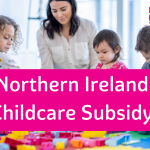All Party Group hears about the impact of childcare policy developments in England on early years and the key role of childcare in tackling disadvantage
The All Party Group on Early Education and Childcare, chaired by Nicola Brogan MLA, met remotely on Thursday 21 September 2023. This meeting brought together more than 70 attendees including elected representatives, senior departmental officials and a wide range of stakeholders representing early education and childcare, the women’s sector, business, parents’ organisations and more.
Before moving on to the main business of the meeting, Chair Nicola Brogan, MLA provided an update on action points from the last meeting:
- Correspondence from the Department of Education Permanent Secretary Mark Browne advised that work on the costed options for the new Early Learning and Childcare Strategy is nearing completion. The options are currently going through a peer review process across the Department and they will then be seeking cross-departmental sign-off. Once this is complete, and if there is still no Executive in place, consideration will then be given to briefing political representatives and stakeholders on the progress made.
- A letter was sent to the Chancellor calling for the removal of the cap on Tax-Free Childcare and in increase in the amount of support for eligible families. No response has yet been received.
- A letter was sent to the Department of Health Permanent Secretary Peter May regarding the timeline for the urgent review of the minimum standards for childminding and day care. No response has yet been received.
Update from Department of Education: Progress on new Early Learning and Childcare Strategy
Tina Dempster, Head of the Childcare Strategy Team within the Department of Education, and Marc Bailie, Head of the Family Policy Unit within the Department of Health, were both in attendance to provide an update on developments and address any matters arising.
Tina advised that costed options to inform the new Early Learning and Childcare Strategy are currently being internally peer reviewed within the Department of Education. These have been developed through consultation with a wide range of stakeholders and an independent review of childcare in Northern Ireland. As an Executive Strategy they will also go to other Government Departments for review. This reflects the cross-cutting nature of the Strategy and the importance of quality assuring all options to avoid any unintended consequences. Tina emphasised that costed options will not be able to progress without Executive agreement. In the interim, it will be for the Permanent Secretary at the Department of Education to decide whether there will be further engagement with elected representatives and stakeholders on the detail of the costed options.
Marc noted the correspondence that has been received by the Department of Health in relation to the review of the minimum standards. He advised that serious consideration is being given to the issues that have been raised and that responses will issue in the near future.
Tackling disadvantage through childcare
Megan Jarvie, Head of Coram Family and Childcare, shared learning and recommendations from a recent briefing on Tackling disadvantage through childcare produced by Coram Institute in partnership with the Joseph Rowntree Foundation.
Focusing on the experience in England, Megan outlined the power of childcare to tackle disadvantage through a dual focus in enabling parents to work and boosting children’s outcomes. However, this opportunity is being missed in England and, as a result, childcare is not achieving its potential to tackle disadvantage and reduce inequality because of undue focus on the parental employment aspect. She emphasised that childcare that supports employment and childcare for early education can work together but that the balance is not right within the system currently.
She highlighted how recent UK Government announcements in relation to childcare policy in England risk making things worse and entrenching, rather than changing, an unequal system. While welcoming the increased investment from the Government into the sector, Megan reinforced the need for a dual approach – recognising the importance of childcare for work AND as early education – an approach that, fundamentally, puts children at the centre. This requires a rethink of the whole system to rebalance priorities based on five building blocks needed to create a childcare system which tackles disadvantage:
- Affordable
- Quality
- Accessed
- Family-focused
- Integrated
To achieve this, complete reform of childcare is needed to create a system that:
- Ensures high-quality childcare is accessible and affordable for all families through a combination of a universal free hour offer, the scale of which can be decided on the basis of quality and ensuring provision is not spread too thin, alongside a co-payment model
- Uses supply-side funding to enable a relentless focus on quality
- Supports children’s development holistically, including when they are not attending childcare
- Guarantees every child a childcare place that meets their needs – including those children with special educational needs.
Over the coming months, Employers For Childcare will be working with the Joseph Rowntree Foundation and Coram Family and Childcare to develop a country-specific briefing for Northern Ireland to accompany the Tackling disadvantage through childcare briefing. This will be published and launched later in the year.
Valuing the early years sector in England
Finally, the group heard from Neil Leitch, Chief Executive of the Early Years Alliance who presented on valuing the early years sector in England. Neil painted the picture of an early years sector that is in crisis – and a key factor behind that crisis is Government policy. Specifically, the 30 hours free childcare scheme in England. He pointed to the knowing underfunding of the scheme, evidenced through Freedom of Information requests which show the Department of Education in England was aware that fully funding the offer to providers was “unaffordable”.
This explains what Neil described as the sector’s reaction of despair, rather than joy, following Chancellor Jeremy Hunt’s announcement earlier this year of the planned extension of the 30 hours free childcare scheme in England which is likely to exacerbate existing problems even further. The consequences that are already being felt across the sector include providers having to close, dedicated and experienced staff being lost from the sector, under-staffing and recruitment challenges and a strong sense of being undervalued. He pointed to the high financial insecurity felt by those working in the sector, where almost half of the workforce are in receipt of in-work benefits to top up their low income. Based on average earnings in the sector, he reflected that across the UK, someone earning the average salary would need 8.8 times their income to secure a mortgage on the average house. Someone earning the average salary in the education and childcare sector would need to find 20.9 times their salary to afford a mortgage for the same house.
Neil highlighted the importance of Government engagement with the sector to test key policies as they are being developed and before they are announced, including asking key questions as set out on the Department for Education (England) website:
- Will it actually work?
- Who made you the expert?
He shared some findings from research carried out by the Early Years Alliance which revealed that while many providers anticipate an increased demand for places for 1 and 2 years olds in their settings as a result of the Government’s announcements, a majority are not planning to increase the number of places they can offer to match that demand.
A key message from Neil was to shift focus from the early years as simply a place where children can be ‘minded’ while their parents go to work to one where the true value of early intervention and quality early education is recognised for its impact on child outcomes into the future. Referring to the 30 hours free childcare scheme in England, he posed the question “when did it become acceptable that a child’s access to early education is dependent on their parent’s earnings?”
Neil closed with a key lesson for policy makers – the need to keep the child at the heart of everything.
Essential learning for Northern Ireland
The presentations offered essential learning for the development of the new Early Learning and Childcare Strategy in Northern Ireland. It is clear that a bespoke, properly funded solution is needed that takes and applies learning from elsewhere – rather than simply following what others have done.
Using the example of the 30 hours free childcare scheme in England, both presenters reflected on the problems that this policy – posed as a solution – has actually caused, and the impact this is now having on children, parents and the wider early learning and childcare sector.
In Northern Ireland we have a generationally significant opportunity to take on board the experience from elsewhere and get new early learning and childcare policy right from the start. Otherwise we risk introducing a policy that does not put children at the centre, or deliver on the dual objectives of child development and supporting parental employment – and that ultimately results in further problems that then need to be addressed.
Thanks to speakers, members and stakeholders for their engagement
The questions and comments from the All Party Group members and stakeholders reflected the power and value of the presentations. Commenting on the meeting, Chair Nicola Brogan MLA thanked the speakers, the members, and all those who attended:
“Today’s All Party Group provided really useful insight into the impact of policy developments in England on children, families and the early years sector. I would like to sincerely thank each of our expert speakers for their time and the insights that they have shared. It’s vital we that we put child development, alongside supporting parental employment, at the centre of our new childcare and early years policy to tackle disadvantage and improve equality for children.
What we heard today reflects both the potential that investment in our early learning and childcare sector can deliver – for our society and economy as a whole – but also the damage that can result from a lack of investment or poorly planned policy. They reinforce the importance of continuing engagement with key stakeholders in the development of the costed options for the new Childcare Strategy and the need for childcare to be an urgent, day-one priority for a restored Executive.”
Looking ahead
Chair Nicola Brogan closed the meeting by thanking all stakeholders for their continued high level of engagement with the All Party Group and advised that the next meeting will be held via Zoom on Thursday 23 November at 2pm. The meeting will focus on the funding reform of the early learning and childcare sector in the Republic of Ireland. Invitations will be issued in due course.
Find out more about the All Party Group on Early Education and Childcare
Further information on the All Party Group on Early Education and Childcare, including links to read more about previous meetings, is available here.
Employers For Childcare provides the Secretariat for the All Party Group on Early Education and Childcare – correspondence to strategy@employersforchildcare.org.





